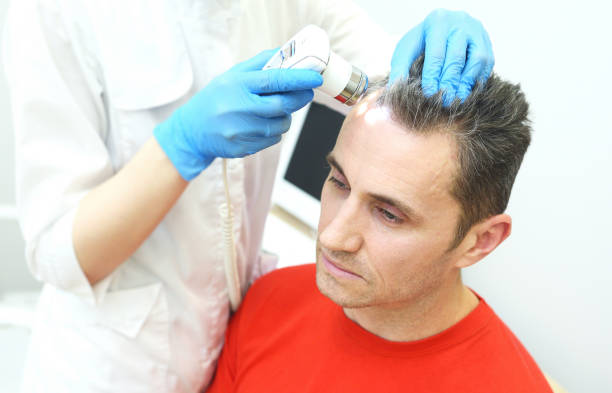Discover Hair Growth Clinical Trials and Emerging Treatment Options
Hair growth trials are exploring new ways to address thinning and hair loss using evolving technologies and treatments. Some trials may offer access to solutions aimed at supporting regrowth and reducing shedding. See if you qualify and learn what options may be available.

What are hair growth clinical trials?
Hair growth clinical trials are research studies that investigate new treatments, medications, or therapies aimed at promoting hair growth or preventing hair loss. These trials typically involve volunteers who meet specific criteria and are willing to participate in testing novel approaches. Researchers carefully monitor participants’ progress, evaluating the safety and efficacy of the treatments being studied.
Clinical trials play a crucial role in advancing our understanding of hair loss and developing more effective solutions. They often explore cutting-edge technologies and techniques that may not yet be available to the general public, offering participants the opportunity to access potentially groundbreaking treatments.
How can emerging treatments improve hair health?
Emerging treatments for hair growth focus on various aspects of hair health, targeting the underlying causes of hair loss and thinning. Some promising approaches include:
-
Stem cell therapy: Researchers are exploring the use of stem cells to regenerate hair follicles and stimulate new growth.
-
Growth factor treatments: These involve applying specific proteins that promote hair follicle growth and improve overall hair health.
-
Low-level laser therapy: This non-invasive treatment uses light energy to stimulate hair follicles and encourage growth.
-
Gene therapy: Scientists are investigating ways to modify genes associated with hair loss to prevent or reverse the condition.
-
Platelet-rich plasma (PRP) therapy: This treatment uses a patient’s own blood platelets to stimulate hair growth and improve hair thickness.
These emerging treatments hold the potential to offer more effective and longer-lasting results compared to traditional hair loss solutions. As research progresses, we may see significant advancements in hair restoration techniques in the coming years.
How can you qualify for current hair growth trials?
Participating in a hair growth clinical trial can be an exciting opportunity to access cutting-edge treatments. To qualify for current trials, consider the following steps:
-
Research ongoing trials: Visit reputable clinical trial databases like ClinicalTrials.gov to find studies related to hair growth.
-
Review eligibility criteria: Each trial has specific requirements for participants, such as age, type of hair loss, and overall health status.
-
Contact the study coordinators: Reach out to the research team for more information and to express your interest in participating.
-
Complete screening processes: You may need to undergo medical examinations or provide detailed health information to determine your eligibility.
-
Understand the commitment: Clinical trials often require regular visits, adherence to treatment protocols, and follow-up assessments.
It’s important to note that participation in clinical trials is voluntary, and you have the right to withdraw at any time. Always discuss your decision with a healthcare professional to ensure it aligns with your overall health goals.
What are the current clinical trial options and providers?
Several reputable organizations and institutions are currently conducting hair growth clinical trials. Here’s an overview of some current options and providers:
| Provider | Trial Focus | Key Features |
|---|---|---|
| Follica, Inc. | Combination therapy for androgenetic alopecia | Combines device-based skin disruption with topical drugs |
| Allergan | Bimatoprost for scalp hair growth | Explores the potential of a prostaglandin analog for hair growth |
| Histogen, Inc. | Hair stimulating complex (HSC) | Investigates cell-conditioned media for hair regrowth |
| Samumed, LLC | SM04554 for androgenetic alopecia | Studies a novel Wnt pathway modulator |
| RepliCel Life Sciences | RCH-01 cellular therapy | Utilizes autologous cell transplantation for hair follicle regeneration |
This table provides a snapshot of some current clinical trial options. However, it’s important to note that the availability and status of trials can change rapidly. Always refer to official clinical trial registries for the most up-to-date information.
How can you explore natural and research-based hair restoration methods?
While clinical trials offer exciting possibilities, there are also natural and research-based methods you can explore to support hair health:
-
Nutritional support: Ensure a balanced diet rich in vitamins and minerals essential for hair growth, such as biotin, iron, and vitamin D.
-
Scalp care: Maintain a healthy scalp environment through proper cleansing and exfoliation to promote optimal hair growth conditions.
-
Stress management: Practice stress-reduction techniques, as chronic stress can contribute to hair loss.
-
Natural supplements: Consider scientifically-backed natural supplements like saw palmetto or pumpkin seed oil, which may help with hair retention.
-
Topical treatments: Explore over-the-counter minoxidil or prescription medications like finasteride under medical supervision.
-
Scalp massage: Regular scalp massages may improve blood circulation and potentially stimulate hair growth.
-
Lifestyle modifications: Avoid harsh hair treatments, excessive heat styling, and tight hairstyles that can damage hair and contribute to loss.
While these methods may not be as cutting-edge as clinical trials, they can complement traditional treatments and support overall hair health. It’s always best to consult with a dermatologist or trichologist to develop a personalized hair care plan tailored to your specific needs and concerns.
In conclusion, the field of hair growth research is evolving rapidly, with clinical trials and emerging treatments offering new hope for those experiencing hair loss. By staying informed about these advancements and exploring both innovative and established hair restoration methods, individuals can take proactive steps towards achieving healthier, fuller hair.
This article is for informational purposes only and should not be considered medical advice. Please consult a qualified healthcare professional for personalized guidance and treatment.




